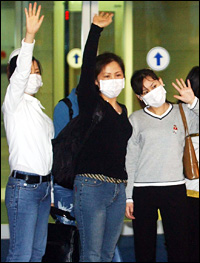NK victims of human trafficking harbor hatred toward Chinese

North Korean defectors wave as they arrive in South Korea from China via Incheon International Airport on May 9, 2003. Many of the defectors harbor hard feelings towards Chinese Koreans here as they were victims of human trafficking at their hands in China. (Photo : Yonhap)
Many North Korean refugees face a variety of ordeals, including human trafficking, in the northeastern region of China before setting foot in South Korea for freedom and a life free of fear.
Traumatic memories haunt them every day even after they find shelter in the South, causing them to bear a grudge toward Chinese Koreans as the majority of brokers who sold them for money there were ethnic Koreans.
In South Korea, bad blood between the two minority groups has caused a crude but new form of China-bashing as the population of the groups has grown over the past decade.
More than 20,000 North Korean refugees are living in South Korea, as do some 600,000 Chinese Koreans.
Cha Kyung-sook, a North Korean defector, said Thursday that she had undergone immense suffering near the Chinese border with North Korea in 2000, shortly after she escaped from North Korea.
Cha was arrested by the Chinese authorities while she was forced to head to an unknown destination by an organized crime group consisting of ethnic Koreans and Chinese.
She was about to be a victim of the sex trade. The broker was going to sell her to someone living in the inner Mongolia region or Amur River, remote rural areas where plenty of old single or divorced men live.
“I was caught by the kidnappers midnight. I panicked and strove to escape in vain. I was stabbed and beaten severely by them,” she said.
Brokers and organized crime groups kidnapped female refugees and sold them to sex offenders, old men or handicapped people living in the agricultural area.
According to a Seoul-based non-profit group “Save North Korea,” sex trade is a thriving business in the northeastern region of China. It said hundreds of brokers, mostly Chinese Koreans, there kidnap female refugees for sex trade. Depending on the age and physical appearance, women in their 20s are sold at from 4 to 6 million won (approximately $2,000 to $4,000) and those in their 30s are 2 to 4 million, the group said.
Brokers call the sex trade victims “pigs” in slang. They make money by selling tens or hundreds of pigs.
After being arrested by the Chinese authorities, Cha was sent to a detention center near the border area with North Korea.
At the detention center she was subjected to beatings and abuse that continued for 35 days before she was repatriated.
“I was beaten severely. I saw many bloody male refugees who were tortured there,” she said.
Later she managed to escape from the North again and then arrived in South Korea safely via China 10 years ago.
The traumatic memories in China hardened her heart toward China and Chinese Koreans, even after she arrived in Seoul.
An Chan-il, another North Korean defector who earned a Ph.D. in political science, said he met many defectors who still harbor anger and hatred toward Chinese Koreans as they were badly treated in China.
“Many of them are the victims of the sex trade and human trafficking, and the offenders were Chinese Koreans. I met many fellow defectors bearing a grudge towards them,” he said.
From July, the victims teamed up to launch the campaign to raise awareness of China’s violations of human rights of refugees and motivate South Koreans to put pressure on the rising power to offer an apology over the torture of Kim Young-hwan.
They held a rally in front of the Okin Presbyterian Church located across the Chinese Embassy in Seoul.
Cha said the Chinese authorities’ torture of refugees was very common in the northeastern part of China, the region where North Koreans cross the border to freedom. “I was not surprised when hearing that freed activist Kim Young-hwan was tortured by the Chinese authorities, because torture and a variety of human rights abuses happen there and many refugees have gone through it,” she said. <The Korea Times/Kang Hyun-kyung>

























































